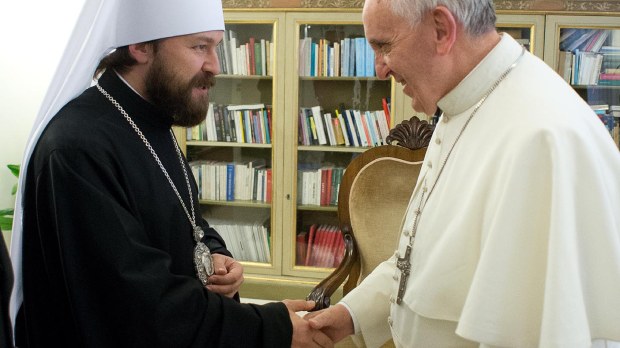On his return to the Apostolic Nunciature around noon on April 29, 2023, the second day of his visit to Hungary, Pope Francis spoke briefly with the Russian Orthodox Metropolitan of Hungary Hilarion. The former ‘foreign minister’ of the Moscow Patriarchate was moved to Budapest in June 2022, in the context of Patriarch Kirill’s support for the Russian offensive in Ukraine, in what was widely interpreted as a “demotion.”
The Vatican press office said the meeting lasted about 20 minutes and took place in “a cordial tone,” but did not provide information on the content of the discussion. The photos released by Vatican News show a warm atmosphere between the two men, with Pope Francis kissing Hilarion’s pectoral cross.
The trip of the Pope to Hungary had raised many rumors and questions about the opportunity of a contact between the head of the Catholic Church and leaders of the Russian Orthodox Church, but nothing had been scheduled in this regard. It was therefore in an informal format that the Pope met with the Metropolitan of the small Russian Orthodox community in Hungary.
Hilarion had a long history of meetings with Pope Benedict XVI — the two share a love for music, and Hilarion is a composer — and with Francis. He was a great architect of the historic meeting in Cuba in 2016 between Francis and Kirill – the first between a pope and a patriarch of Moscow since the schism of 1054. Thus his move to Hungary was seen as Rome losing one of its privileged interlocutors with the Russian Orthodox world.
His successor, Metropolitan Anthony, nevertheless met Pope Francis at the Vatican a few weeks later, and then met him again at the interreligious summit organized in Kazakhstan in September 2022. He told reporters at the time that a summit between the two Church leaders was still under consideration.
The death of Benedict XVI on December 31, 2022, also brought Kirill to send his condolences to Pope Francis. Similarly, the 10 years of Francis’ pontificate, on March 13, 2023, was greeted in another statement from the patriarch. “In the current difficult circumstances, you make a significant contribution to the preaching of the Gospel of Christ and pay attention to the development of interreligious cooperation,” Patriarch Kirill said.
Regarding an upcoming meeting between the two men, Archbishop Paolo Pezzi of the Moscow diocese told I.MEDIA last February that he was “very positive.” Explaining that certain past declarations had left a “certain bitterness” on the side of Moscow, he emphasized that “the doors [were] open” and that “the bridges [had] not been destroyed.”
Hungary: a bridge to Moscow?
If the move of Metropolitan Hilarion was logically interpreted as a sign of a hardening of the line of the Holy Synod of the Russian Orthodox Church and of Patriarch Kirill towards the West, his presence in Hungary can also constitute an opportunity for contacts between the Moscow Patriarchate and the Catholic Church.
Before the Pope’s arrival in Budapest, however, a Vatican source noted that Metropolitan Hilarion “is no longer in business” since his resignation. “He has lost all his positions and prerogatives and is no longer a permanent member of the Holy Synod,” the source said, pointing out that the Moscow Patriarchate is a “complex” and divided world.
The Jesuit perspective of the Pope and his concern to approach world geopolitics through the mediation of the ‘peripheries’ can nevertheless corroborate the thesis of a desire to rely on the presence of Hilarion in Hungary to maintain channels with Russian Orthodoxy, especially since Cardinal Péter Erdö, Primate of Hungary, is very much involved in this ecumenical dialogue.
The absence of Cardinal Kurt Koch, Prefect of the Dicastery for the Promotion of Christian Unity, from the papal delegation can be interpreted as the Pope’s desire to show openness towards the Moscow Patriarchate.
The Swiss cardinal, unlike the Argentine pontiff, is in fact perceived as taking a firm line toward the head of the Russian Orthodox Church.
“The pseudo-religious justification of the war by Patriarch Kirill must shake every ecumenical heart,” he said in June 2022 in an interview with Die Tagespost, comparing the attitude of Patriarch Kirill regarding the invasion of Ukraine to a “heresy.”

